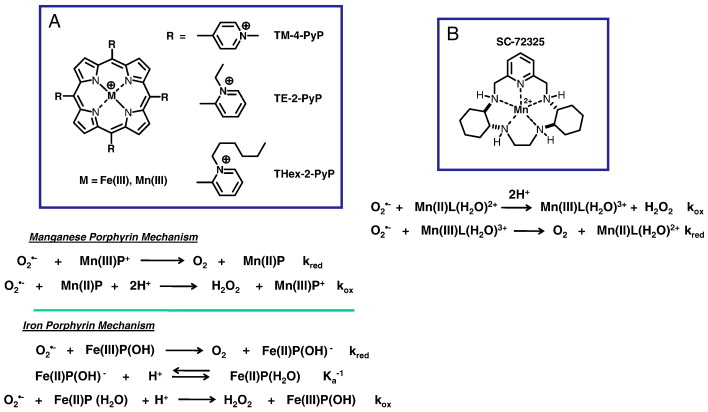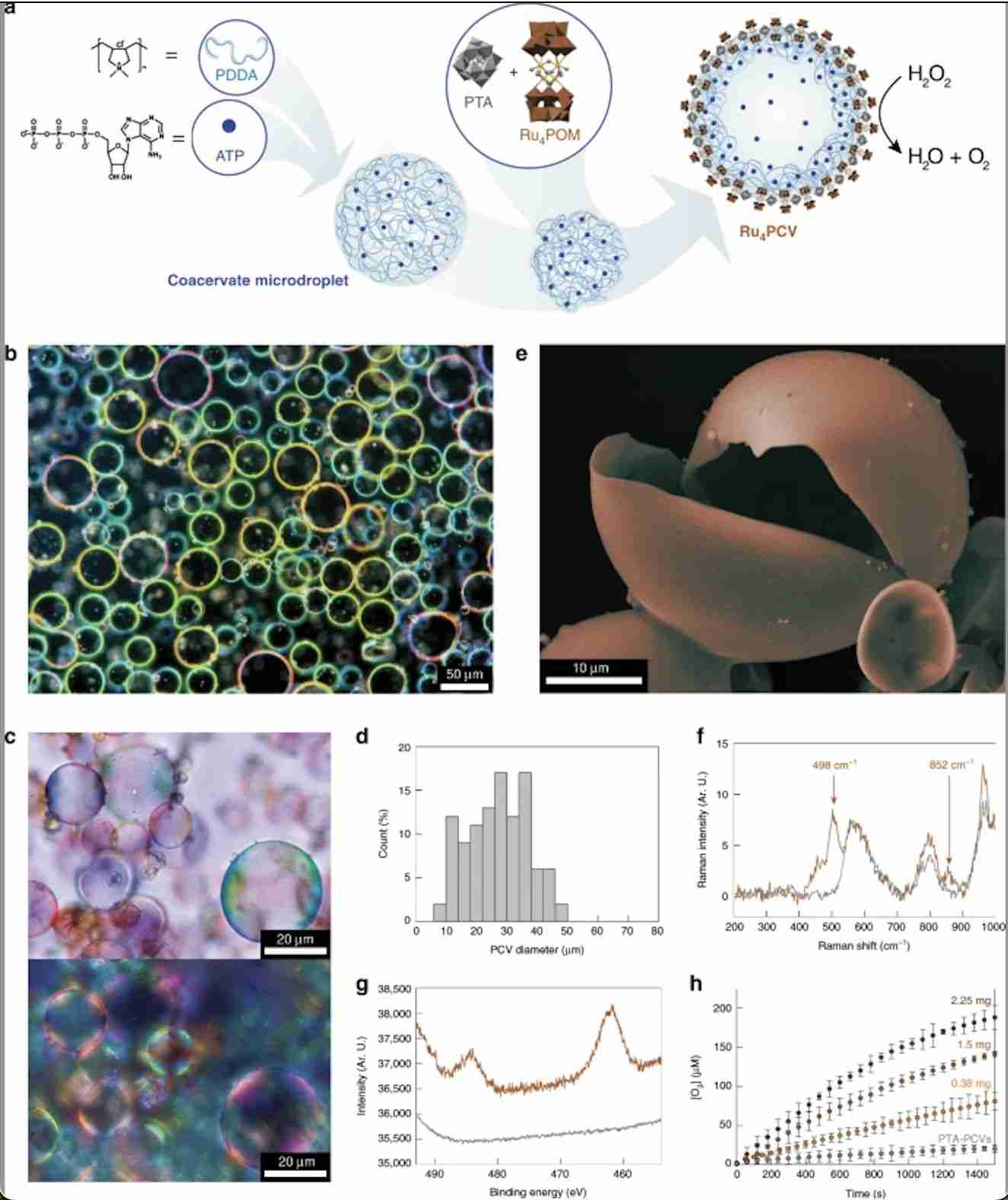Synzymes Engineering Service is a highly specialized service that concentrates on the design, optimization, and application of artificial enzymes, known as Synzymes. These are bioengineered enzymes that are tailored to perform specific tasks more efficiently than their natural counterparts. Synzymes find their applications in a myriad of industries, most notably pharmaceuticals, biofuels, and food production. The study and application of Synzymes have the potential to revolutionize these industries by enhancing operational efficiency and promoting sustainability. This makes the understanding and usage of Synzymes a necessity in today's rapidly evolving technological landscape.
 Targeting peroxynitrite driven nitroxidative stress with synzymes (Daniela S. and William N., 2010)
Targeting peroxynitrite driven nitroxidative stress with synzymes (Daniela S. and William N., 2010)
Service Process
Our Synzymes Engineering Service process is thorough and systematic, and consists of several key steps:
- Initial Consultation: This is the first step where we meet with our clients to understand their specific needs and the challenges they face. We discuss their expectations and the specific tasks they need the Synzymes to perform. This initial exchange of information is crucial for the success of the project.
- Design and Optimization of Synzymes: Based on the information gathered during the initial consultation, our team of experienced bioengineers begin the process of designing and optimizing Synzymes. This involves tailoring the Synzymes to meet the specified requirements and ensure they work efficiently. This step is crucial and requires a high level of expertise and precision.
- Rigorous Testing and Validation: Once the Synzymes are designed and optimized, they undergo a rigorous testing and validation process. During this stage, we confirm their performance, efficiency, and safety. This step is critical in ensuring that the Synzymes function as expected and are safe for use.
- Delivery of Final Product: Upon successful validation, we deliver the final product to the client. The product delivered is a result of meticulous work, and we ensure that it meets the client's specifications and expectations.
- After-Sales Service: Our commitment to our clients does not end with the delivery of the final product. We provide comprehensive after-sales service, which includes support, troubleshooting, and regular follow-ups. This ensures that our clients can effectively use the Synzymes and get the most out of our service.
This comprehensive process ensures that we are not only meeting, but exceeding your expectations at every step of the way. If you have any questions, need more information, or would like to discuss a potential project, please don't hesitate to contact us. Our team is always eager to help and share our expertise.
Applications
| Application |
Description |
| Drug Application |
Synzymes Engineering specializes in developing enzyme-based solutions for drug delivery and pharmaceutical manufacturing. Our enzymes are tailored to enhance drug bioavailability, stability, and targeting. We collaborate with pharmaceutical companies to create innovative drug delivery systems, including enzyme-conjugated drugs and enzyme-responsive carriers, advancing personalized medicine and drug development. Additionally, we provide enzymatic synthesis of pharmaceutical intermediates, enabling sustainable and cost-effective manufacturing processes in the pharmaceutical industry. |
| Healthcare |
Synzymes Engineering specializes in developing customized synthetic enzymes for healthcare applications. These enzymes are tailored for diagnostic tools, therapeutic interventions, and drug delivery systems, enhancing patient care and treatment outcomes. |
| Agriculture |
Synzymes Engineering develops enzyme-based solutions to enhance agricultural practices. Our enzymes improve crop yield, nutrient uptake, and pest resistance, fostering sustainable agriculture and food security. |
| Environmental Remediation |
Synzymes Engineering engineers enzymes for environmental remediation, aiding in the degradation of pollutants and the cleanup of contaminated sites, thus promoting environmental health and sustainability. |
| Food and Beverage |
Synzymes Engineering provides enzyme solutions for the food and beverage industry, optimizing food processing, flavor enhancement, and nutritional enrichment, ensuring product quality and consumer satisfaction. |
Case Study
This case showcases the creation of synzyme protocells (Ru4PCVs) from polymer/nucleotide coacervate micro-droplets using a bio-inspired Ru-based polyoxometalate catalyst. These synzyme protocells exhibit catalase-like activity and are utilized in multi-compartmentalized cell-like models for collective buoyancy, parallel catalytic processing, and chemical signaling within protocell communities. (a) Scheme showing the self-assembly of catalytic Ru4PCVs. Membrane-free non-catalytic PDDA/ATP coacervate micro-droplets are reconfigured into catalytic membrane-bounded coacervate vesicles by electrostatically induced surface binding of Ru4POM and PTA polyanions. Membrane formation is accompanied by changes in osmotic pressure that generate a three-tiered micro-architecture consisting of a Ru4POM/PTA/PDDA catalytic membrane, a PDDA/ATP sub-membrane coacervate shell, and an expanded aqueous lumen. (b) Dark-field microscopy image showing a population of Ru4PCVs in aqueous solution. (c) Bright-field microscopy image of a lyophilized sample of Ru4PCVs (top), and corresponding cross-polarized image (bottom) showing birefringence. (d) Size distribution for Ru4PCVs produced by addition of a Ru4POM/PTA mixture (7:1 molar ratio) to coacervate microdroplets after 30 s of stirring. (e) SEM image of a lyophilized single Ru4PCV showing hollow interior and smooth outer membrane surface. Images have been artificially colored to mimic the real tinge of the material. (f) Raman spectra of lyophilized Ru4PCVs (light brown) and PTA-CVs (gray) powders. (g) XPS spectra (Ru 3p region) of lyophilized Ru4PCVs (light brown) and PTA-CVs (gray) powders. (h) Room temperature kinetic plots of dioxygen evolution against Ru4PCVs concentration (mg in PBS buffer (500 μL, 10 mM, pH 6.5, Ar purged)) at [H2O2] = 2.8 M showing protocell-mediated synzyme activity.
 Catalytic activity of synzyme protocells (Pierangelo Gobbo, et al., 2020)
Catalytic activity of synzyme protocells (Pierangelo Gobbo, et al., 2020)
FAQs
Below, you will find a comprehensive list of Frequently Asked Questions (FAQs) that we have compiled regarding Synzymes and our Synzymes Engineering Service. These questions span a broad variety of topics, ranging from the intricate process involved in the creation of Synzymes, right through to their diverse potential applications. Our goal is to provide you with a thorough understanding of this fascinating subject and the services we offer. If you have more specific or detailed questions, don't hesitate to get in touch with us directly.
Q: Could you explain what exactly Synzymes are?
A: Synzymes, essentially, are a remarkable class of bioengineered enzymes. These are artificially created using sophisticated technologies. Notably, they are meticulously designed and optimized with a specific purpose in mind, allowing them to perform certain functions with a significantly higher efficiency than their naturally occurring counterparts.
Q: Why is there such a high level of importance attached to Synzymes?
A: Synzymes are regarded as immensely important largely due to their customizability. They possess the unique ability to be tailored to perform tasks with a level of efficiency that far surpasses what we see in natural enzymes. This key feature is what makes them an indispensable asset in a myriad of industries.
Q: Can you shed some light on how Synzymes are created?
A: The creation of Synzymes is truly a marvel of modern bioengineering processes. It involves the careful design and optimization of enzymes to achieve desirable characteristics. These targeted modifications can significantly enhance their performance, contributing to their popularity.
Q: In what ways are Synzymes different from the natural enzymes we know of?
A: The primary distinction between natural enzymes and Synzymes lies in their capabilities. While natural enzymes are restricted by their inherent characteristics, Synzymes have the advantage of being meticulously engineered to perform specific tasks with an enhanced efficiency and precision that is hard to match.
Q: Can we consider Synzymes to be safe?
A: Absolutely, Synzymes are created with the utmost attention to safety. They undergo rigorous testing and validation procedures to ensure their safety and effectiveness. This makes them a reliable option in various applications.
Q: Is it possible for Synzymes to entirely replace natural enzymes?
A: Despite the numerous advantages offered by Synzymes, they are not designed or intended to fully replace natural enzymes. Rather, their role is to complement and enhance the existing biological processes, thereby improving overall efficiency and effectiveness.
Q: What sort of industries stand to benefit from the use of Synzymes?
A: The versatility of Synzymes allows for their application in a wide range of industries. This includes, but is not limited to, sectors such as pharmaceuticals, biofuels, and food production.
Q: How can Synzymes contribute to sustainability efforts?
A: Synzymes can make a significant contribution to sustainability efforts. By enhancing process efficiency and reducing reliance on finite natural resources, they can help promote sustainable industrial practices.
Q: What does the future hold for Synzymes?
A: With the continuous advancements being made in the field of bioengineering, the potential of Synzymes seems limitless. They are poised to play a transformative role in various industries, revolutionizing processes and setting new standards in efficiency and effectiveness.
Q: I'm interested in the Synzymes Engineering Service. How can I avail of it?
A: If you have an interest in our Synzymes Engineering Service, we would be more than happy to provide you with more detailed information. Please do not hesitate to contact us.

































 Targeting peroxynitrite driven nitroxidative stress with synzymes (Daniela S. and William N., 2010)
Targeting peroxynitrite driven nitroxidative stress with synzymes (Daniela S. and William N., 2010) Catalytic activity of synzyme protocells (Pierangelo Gobbo, et al., 2020)
Catalytic activity of synzyme protocells (Pierangelo Gobbo, et al., 2020)